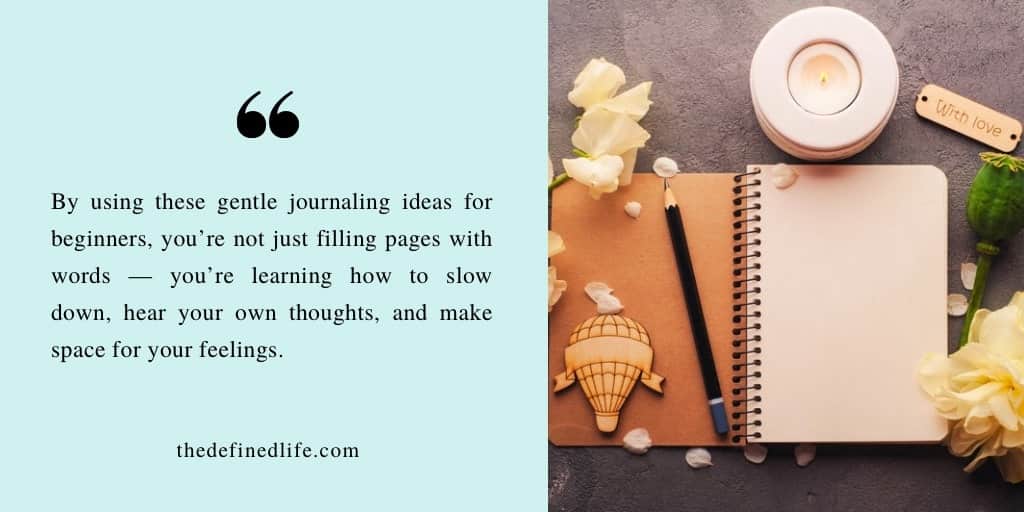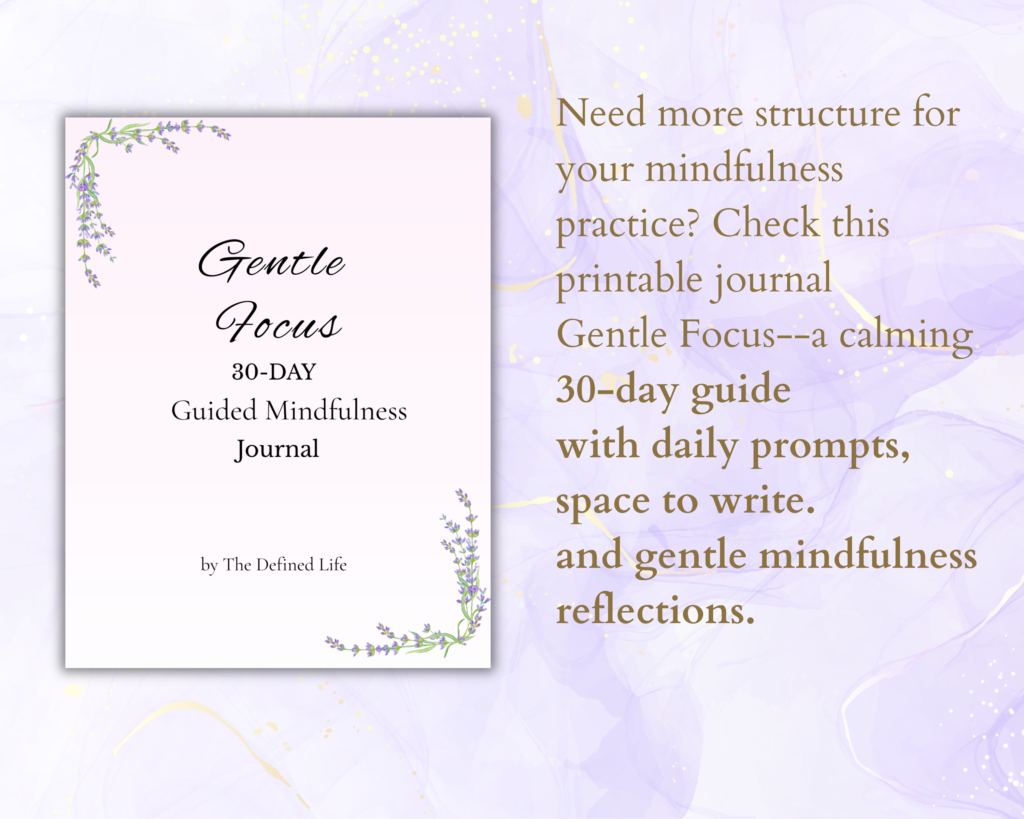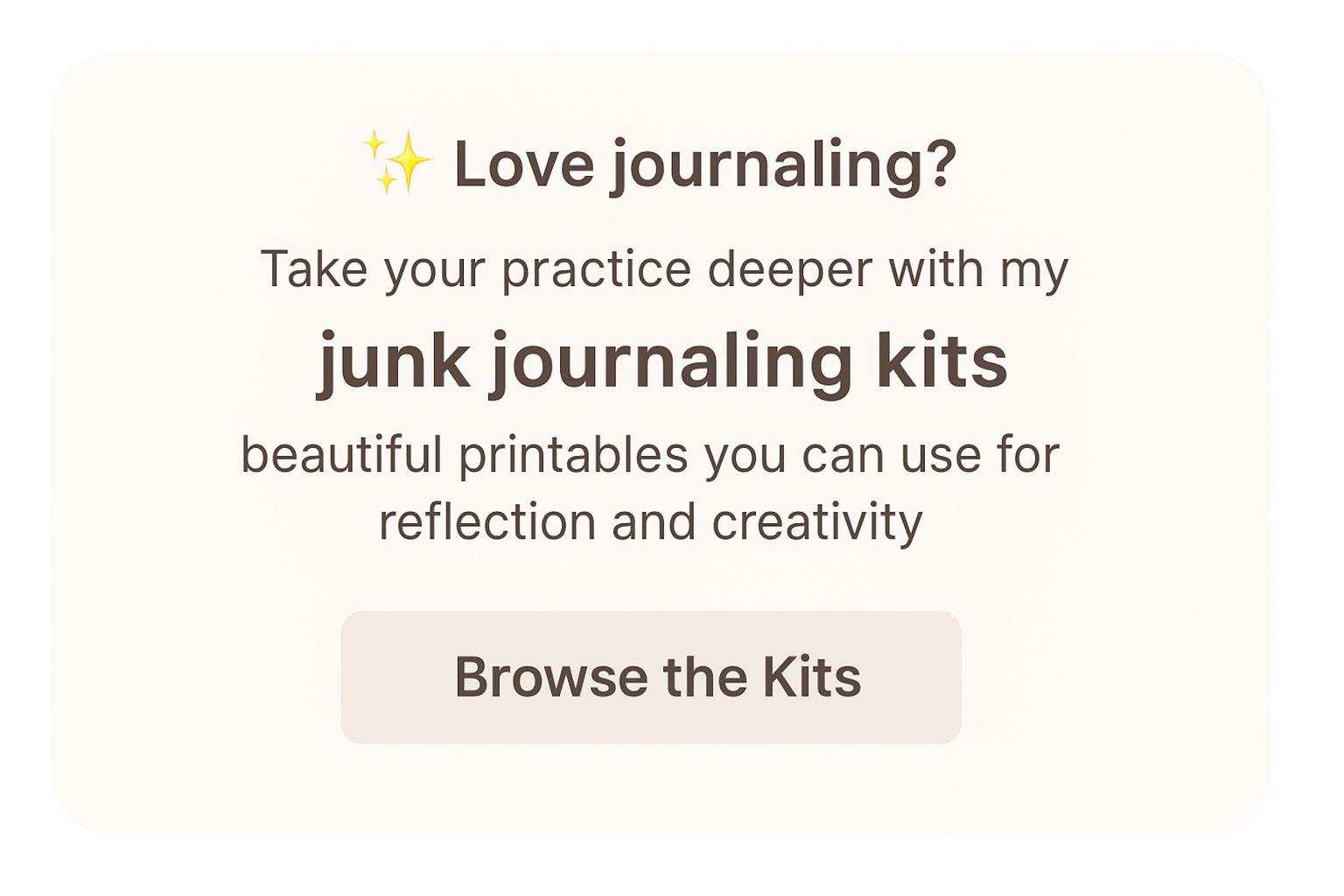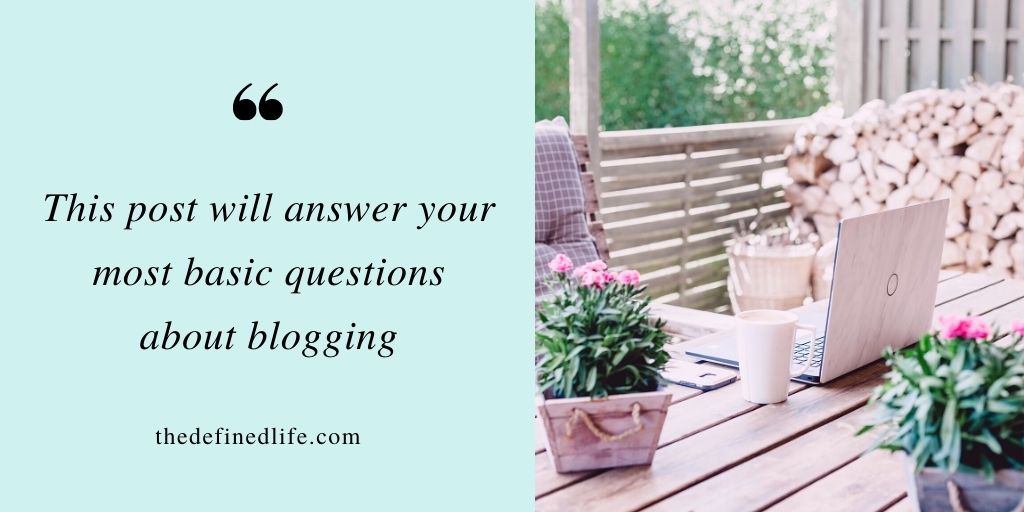
If you’ve been meaning to start journaling but always get stuck on how, you’re in the right place.
These journaling ideas for beginners are here to make the habit feel less overwhelming and more honest — no pressure, no perfection. Just a safe space to slow down, notice what’s on your mind, and get to know yourself a little better each day.
If you’re anything like me — someone who feels things deeply and easily picks up on other people’s emotions — journaling can be a powerful way to protect your own energy. Or if you simply want to slow down and clear your head… make sense of your emotions… or just write something real for once. These gentle prompts and simple tips will help you begin in a way that actually fits your life.
No fancy tools needed. No deep thoughts required. Just you, a pen, and a moment to show up for yourself.
Let’s make this simple.
Table of Contents
Why These Journaling Ideas for Beginners May Help
Writing helps you slow down your thoughts. When everything in your mind feels tangled and loud, journaling gives you a place to pause. Putting words to your feelings turns the mental chaos into something you can actually understand. Suddenly, what felt overwhelming becomes clearer — not fixed, but seen.
It gives you space to feel emotions without judgment — something we rarely get in everyday life. You don’t have to explain yourself. You don’t have to be strong or say the “right” thing. On the page, you’re free to feel what you feel. Anger. Gratitude. Confusion. Hope. It all belongs.

Over time, journaling supports your mental health and emotional well-being. You start noticing patterns. You become more aware of your needs. You learn how to check in with yourself instead of pushing everything aside. That’s powerful — and deeply healing.
And when you journal with intention, something even more meaningful happens: You grow. Not in a dramatic, overnight way. But quietly, in small moments of honesty and reflection. You start showing up for yourself. You start becoming more of who you really are.
Gentle Journaling Ideas for Beginners
You don’t need a fancy notebook, perfect handwriting, or a 30-minute routine to start journaling. All you really need is a few quiet minutes and a willingness to check in with yourself.
These gentle journaling prompts are designed to help you ease into the process — no pressure, no judgment. Whether you write two sentences or two pages, you’re showing up for yourself.
Try one of these today. Just five minutes can be enough to shift your mood and create space for clarity.

Learn more about Junk Journaling– A fun way to start journaling
- “Right now, I’m feeling…”
Start with this simple emotional check-in. Let yourself name whatever you’re feeling — even if it doesn’t make perfect sense. No need to sound poetic or “figure it out.” Just put words to the experience. You might be surprised how often clarity follows honesty. - “Something that’s been on my mind lately is…”
This prompt gives shape to the thoughts you’ve been carrying around. It’s a gentle way to explore mental clutter, recurring worries, or even exciting ideas you haven’t had time to process. Once it’s on paper, your mind can take a breath. - “What do I need more of in my life?”
Use this to reconnect with what matters. Do you need more rest? More creative time? More boundaries, movement, joy, or connection? Let your answer come from the gut — not from what you think should matter, but what your soul is actually asking for. - “A memory that’s been showing up for me is…”
Sometimes, certain memories resurface without warning. They might feel random, but writing about them often reveals hidden patterns or emotions that want to be seen. You don’t need to analyze — just describe and reflect. - “What’s one thing I want to let go of today?”
We all carry things we no longer need — a small frustration, a lingering regret, a pressure to be perfect. This prompt is a chance to let one of those go, even if just for today. Think of it as an emotional exhale.


Tips for Keeping It Simple
Journaling doesn’t have to be complicated to be effective. You don’t need a perfect routine, a quiet life, or poetic words. What matters most is simply showing up — in your own way, in your own time.
Here are a few gentle reminders to help keep your journaling practice simple and sustainable:
Set a time — even just 5 minutes before bed.
You don’t need an hour. Choose a pocket of time that feels doable. Five minutes while your tea steeps. A few moments before sleep. Journaling fits best when it feels like a pause, not a task.
Don’t aim to be deep. Just be real.
You don’t have to write profound insights or powerful metaphors. Just be honest. Say what’s on your mind or in your heart. Some days it might be messy, mundane, or unclear — and that’s completely okay.

Write like no one will read it (because no one will).
Your journal is your private space. There’s no need to impress or explain. Let your words be raw, unfinished, or even scattered. You’re not performing — you’re processing.
If you skip days, that’s okay.
You’re not failing. Life gets busy, and routines shift. The good news? Journaling will always be there when you’re ready to come back to it. One missed day (or week) doesn’t undo your progress. Every entry is a fresh start.

Journaling is one of the simplest ways to reconnect with yourself — and it doesn’t require a big commitment to make a big difference. When I don’t have anyone to talk to, I open my journal and write my thoughts. Because sometimes, we need to let those emotions out without fear of being judged.
If you’re just starting, focus on keeping it light, low-pressure, and consistent enough. Over time, those small moments add up to real reflection and emotional clarity.
You don’t have to do it perfectly — you just have to begin.
Final Thoughts on Journaling Ideas for Beginners

Forget perfect handwriting, washi tape, or clever quotes. What matters most is that you’re showing up for yourself, even if it’s messy, emotional, or awkward.
By using these gentle journaling ideas for beginners, you’re not just filling pages with words — you’re learning how to slow down, hear your own thoughts, and make space for your feelings. You’re building a quiet, personal habit of self-care. You’re learning how to be kind to your mind.
That’s not just enough.
That’s powerful.








Leave a Reply